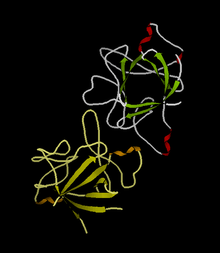Anakinra
 | |
| Clinical data | |
|---|---|
| Trade names | Kineret |
| AHFS/Drugs.com | Monograph |
| MedlinePlus | a602001 |
| License data | |
| Pregnancy category |
|
| Routes of administration | Subcutaneous |
| ATC code | |
| Legal status | |
| Legal status | |
| Pharmacokinetic data | |
| Bioavailability | 95% |
| Metabolism | predominantly renal |
| Elimination half-life | 4-6 hrs |
| Identifiers | |
| |
| CAS Number | |
| DrugBank | |
| ChemSpider |
|
| UNII | |
| KEGG | |
| ChEMBL | |
| Chemical and physical data | |
| Formula | C759H1186N208O232S10 |
| Molar mass | 17,257.6 g/mol g·mol−1 |
| | |
Anakinra (brand name Kineret) is a biopharmaceutical drug used to treat rheumatoid arthritis. It is a recombinant and slightly modified version of the human interleukin 1 receptor antagonist protein. It is marketed by Swedish Orphan Biovitrum.[1]
Medical use
Anakinra is administered at home by subcutaneous injection.[2]
It is used as a second line treatment to manage symptoms of rheumatoid arthritis after treatment with a disease-modifying antirheumatic drug (DMARD) has failed.[1][2] It can be used in combination with some DMARDs.[1][2][3]
It is used to treat anyone from infants to adults with a cryopyrin-associated periodic syndrome, including neonatal-onset multisystem inflammatory disease.[1][2]
It is used off label to treat Schnitzler's syndrome.[4]
It was not tested in pregnant women, but appeared to be safe in animal studies.[2]
It should not be used in people who have active infections or latent tuberculosis, who have low white blood cells counts, or who are taking TNF inhibitors.[2]
Adverse effects
More than ten percent of people taking Anakinra have injection site reactions, headaches, and have increased levels of cholesterol in their blood.[1] Between one and ten percent of people have severe infections, decreased white blood cells, or decreased platelets.[1] It is unclear if taking Anakinra increases the risk of getting cancer; studies are complicated by the fact that people with rheumatoid arthritis are already at higher risk of getting cancer.[1][3]
Chemistry
Anakinra is a protein that differs from the sequence of Interleukin 1 receptor antagonist by one methionine added to its N-terminus; it also differs from the human protein in that it is not glycosylated, as it is manufactured in Escherichia coli.[2]
History
It was first approved in the US in 2001[2] and Europe in March 2002.[1]
In June 2018 NHS England published a Clinical Commissioning Policy: Anakinra to treat periodic fevers and autoinflammatory disorders (all ages) allowing Anakinra to be commissioned as a first-line treatment for Schnitzler's syndrome and in cases where the first-line treatment is not effective for Familial Mediterranean fever, Hyper-IgD syndrome also known as Mevalonate kinase deficiency, and TNF receptor associated periodic syndrome (TRAPS),[5] and a Clinical Commissioning Policy: Anakinra/tocilizumab for the treatment of Adult-Onset Still's Disease refractory to second-line therapy (adults), allowing Anakinra to be commissioned for Adult-onset Still's disease "as a third line treatment where patients are refractory to steroid-sparing effect DMARDs".[6]
Anakira effectively treated meningitis caused by a rare genetic mutation in the gene NALP3 in a 67-year-old man enrolled in the Undiagnosed Diseases Network.[7] Researchers at Johns Hopkins University announced in 2019 that anakinra given to pregnant mice with Zika virus had reduced fetal deaths and birth defects.[8] In November 2019 researchers at the University of Manchester reported that Anakinra might have a use in preventing breast cancer from spreading to the bones.[9][10]
References
- ^ a b c d e f g h "UK Anakinra label". UK Electronic Medicines Compendium. 5 October 2017. Retrieved 23 March 2018.
- ^ a b c d e f g h "US Anakinra label" (PDF). FDA. May 2016. Retrieved 23 March 2018. For label updates see FDA index page for BLA 103950
- ^ a b Singh, JA; Hossain, A; Tanjong Ghogomu, E; Kotb, A; Christensen, R; Mudano, AS; Maxwell, LJ; Shah, NP; Tugwell, P; Wells, GA (13 May 2016). "Biologics or tofacitinib for rheumatoid arthritis in incomplete responders to methotrexate or other traditional disease-modifying anti-rheumatic drugs: a systematic review and network meta-analysis". The Cochrane Database of Systematic Reviews (5): CD012183. doi:10.1002/14651858.CD012183. PMID 27175934.
- ^ Gusdorf, L; Lipsker, D (August 2017). "Schnitzler Syndrome: a Review". Current Rheumatology Reports. 19 (8): 46. doi:10.1007/s11926-017-0673-5. PMID 28718061.
- ^ NHS England (29 June 2018). Clinical Commissioning Policy: Anakinra to treat periodic fevers and autoinflammatory disorders (all ages) (PDF). Retrieved 9 July 2018.
- ^ NHS England (29 June 2018). Clinical Commissioning Policy: Anakinra/tocilizumab for the treatment of Adult-Onset Still's Disease refractory to second-line therapy (adults) (PDF). Retrieved 13 July 2018.
- ^ Kolata, Gina (2019-01-07). "When the Illness Is a Mystery, Patients Turn to These Detectives". The New York Times. ISSN 0362-4331. Retrieved 2019-01-09.
- ^ "Rheumatoid Arthritis Drug Diminishes Zika Birth Defects in Mice". Newsroom. Johns Hopkins Medicine. 6 May 2019. Retrieved 5 September 2019.
- ^ "Arthritis drugs could be repurposed to help prevent breast cancer spreading to the bone, study suggests". Press release. University of Manchester. 20 November 2019. Retrieved 21 November 2019.
- ^ Eyre, Rachel; Alférez, Denis G.; Santiago-Gómez, Angélica; Spence, Kath; McConnell, James C.; Hart, Claire; Simões, Bruno M.; Lefley, Diane; Tulotta, Claudia; Storer, Joanna; Gurney, Austin; Clarke, Noel; Brown, Mick; Howell, Sacha J.; Sims, Andrew H.; Farnie, Gillian; Ottewell, Penelope D.; Clarke, Robert B. (1 November 2019). "Microenvironmental IL1β promotes breast cancer metastatic colonisation in the bone via activation of Wnt signalling". Nature Communications. 10 (1): 5016. doi:10.1038/s41467-019-12807-0. PMC 6825219. PMID 31676788.
